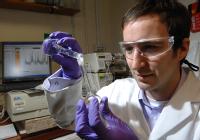New antibiotics could come from a DNA binding compound that kills bacteria in 2 minutes

 A synthetic DNA binding compound has proved surprisingly effective at binding to the DNA of bacteria and killing all the bacteria it touched within two minutes. The DNA binding properties of the compound were first discovered in the Department of Chemistry at the University of Warwick by Professor Mike Hannon and Professor Alison Rodger (Professor Mike Hannon is now at the University of Birmingham). However the strength of its antibiotic powers have now made it a compound of high interest for University of Warwick researchers working on the development of novel antibiotics.
A synthetic DNA binding compound has proved surprisingly effective at binding to the DNA of bacteria and killing all the bacteria it touched within two minutes. The DNA binding properties of the compound were first discovered in the Department of Chemistry at the University of Warwick by Professor Mike Hannon and Professor Alison Rodger (Professor Mike Hannon is now at the University of Birmingham). However the strength of its antibiotic powers have now made it a compound of high interest for University of Warwick researchers working on the development of novel antibiotics.
Dr Adair Richards from the University of Warwick said:
"This research will assist the design of new compounds that can attack bacteria in a highly effective way which gets around the methods bacteria have developed to resist our current antibacterial drugs. As this antibiotic compound operates by targeting DNA, it should avoid all current resistance mechanisms of multi-resistant bacteria such as MRSA."
The compound [Fe2L3]4+ is an iron triple helicate with three organic strands wrapped around two iron centres to give a helix which looks cylindrical in shape and neatly fits within the major groove of a DNA helix. It is about the same size as the parts of a protein that recognise and bind with particular sequences of DNA. The high positive charge of the compound enhances its ability to bind to DNA which is negatively charged.
When the iron-helicate binds to the major groove of DNA it coils the DNA so that it is no longer available to bind to anything else and is not able to drive biological or chemical processes. Initially the researchers focused on the application of this useful property for targeting the DNA of cancer cells as it could bind to, coil up and shut down the cancer cell's DNA either killing the cell or stopping it replicate. However the team quickly realised that it might also be a very clever way of targeting drug-resistant bacteria.
New research at the University of Warwick, led by Dr Adair Richards and Dr Albert Bolhuis, has now found that the [Fe2L3]4+ does indeed have a powerful effect on bacteria. When introduced to two test bacteria Bacillus subtilis and E. coli they found that it quickly bound to the bacteria's DNA and killed virtually every cell within two minutes of being introduced - though the concentration required for this is high.
Professor Alison Rodger, Professor of Biophysical Chemistry at the University of Warwick, said:
"We were surprised at how quickly this compound killed bacteria and these results make this compound a key lead compound for researchers working on the development of novel antibiotics to target drug resistant bacteria."
The researchers will next try and understand how and why the compound can cross the bacteria cell wall and membranes. They plan to test a wide range of compounds to look for relatives of the iron helicate that have the same mechanism for action in collaboration with researchers around the world.Professor
Mike Hannon from the University of Birmingham said:"This research is a great example of how the Universities of Birmingham and Warwick are working together to deliver exciting new research that can impact on medicine and healthcare - key themes of the AWM "Birmingham Science City" initiative which seeks to make the West Midlands the leading player in science and technology in the UK."
The research has just been published in the International Journal of Antimicrobial Agents in a paper entitled Antimicrobial activity of an iron triple helicate by Dr Adair D. Richards, and Professor Alison Rodger from the University of Warwick, Professor Michael J. Hannon from the University of Birmingham and Dr Albert Bolhuis from Bath University. Issue 33 pp469-472 http://www.ijaaonline.com/article/S0924-8579(08)00577-3
For further information please contact
Adair Richards
University of Warwick on
+44 (0)24 7657 5797
adair.richards@warwick.ac.uk
or
Peter Dunn, Press and Media Relations Manager
University House,
University of Warwick, Coventry, CV4 8UW, United Kingdom
email: p.j.dunn@warwick.ac.uk
Tel: +44 (0)24 76 523708 Mobile/Cell: +44 (0)7767 655860
Twitter: @PeterJDunn
8th June 2009
